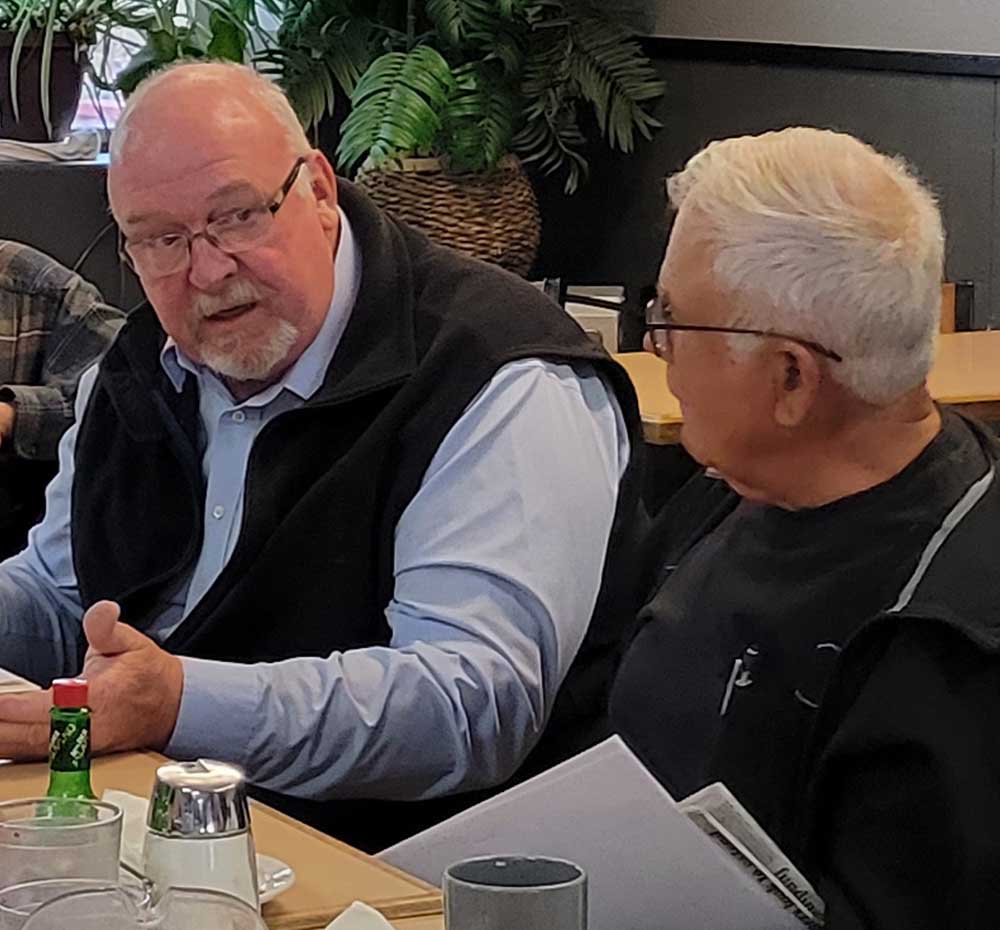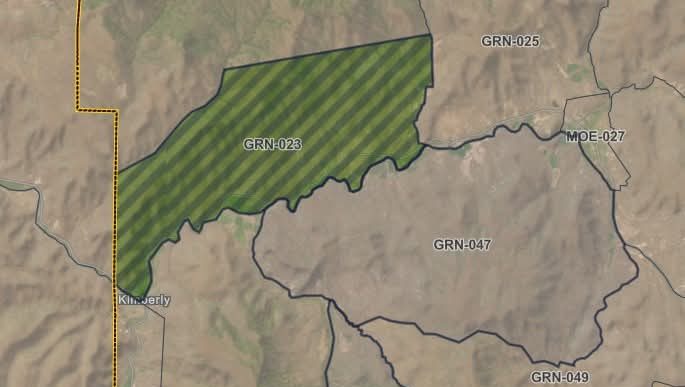Findley hosts meet-and-greet in John Day
Published 7:45 am Wednesday, November 3, 2021

- 20211029_110926.jpg
JOHN DAY — State Sen. Lynn Findley, R-Vale, met with roughly a dozen Grant County residents Friday, Oct. 29, for a community coffee at the Squeeze-In Restaurant and Deck in John Day.
Trending
In a wide-ranging session, Findley touched on redistricting, water issues, and where he comes down on the push in many rural counties to ditch Oregon for Idaho.
Findley said he had two distinct issues with how the Legislature handled redistricting, the once-a-decade process by which state governments draw new congressional and state legislative district boundaries after the U.S. census: one had to do with the congressional map while the other dealt with the legislative map.
Findley said politicians largely left the public out of the process. Moreover, he said, the majority Democrats blatantly gerrymandered the political boundaries on both maps to favor their party.
Trending
Oregon’s steady population growth gave the state more political clout in Congress. The U.S. Census Bureau’s report, released in April, showed the state’s population increased by 10% over the past decade, resulting in the need to create a sixth House district.
The new map creates four safely Democratic congressional districts, one solidly Republican district and one that tilts slightly left and could be considered a toss-up.
Findley said the map was approved after House Speaker Tina Kotek revoked a deal she made with GOP lawmakers.
In April, Findley said, Kotek made “a handshake deal” that gave House Republicans equal representation on the redistricting committee in exchange for their promise to stop blocking bills with delaying tactics.
However, according to Findley, Kotek rescinded the deal on Sept. 20. According to Findley, Kotek essentially split the House redistricting committee in two: a committee with equal numbers of Democrats and Republicans to finalize legislative maps and a committee with a Democratic majority draw the congressional map.
Since the issue is now part of ongoing litigation, Danny Moran, Kotek’s communications director, declined to comment in a Monday email.
Findley said the Democratics also gerrymandered legislative districts, protecting their majority in both chambers and giving too much weight to incumbency.
For example, he noted a district in the Salem area that was nearly a toss-up in the last election, with the outcome decided by only about 400 votes. The new map protects the Democratic incumbent by nearly 8 percentage points.
Ultimately, Findley said, red districts got redder and blue districts got bluer. However, he said, there are more blue districts in the state.
That, he said, is the basis of a lawsuit filed last month in the state Supreme Court to overturn the legislative redistricting plan.
The congressional map, Findley added, is being adjudicated in a separate process by a five-judge panel of state circuit court judges.
Findley said it is early in the process, but a decision would need to happen at “rocket speed” to beat filing deadlines for upcoming elections.
Findley said the changes to his own district make sense geographically. For instance, his district now includes Crook County but he no longer represents Wasco County.
Nonetheless, he said he is looking at redistricting through the lens of the public, which, despite 22 virtual sessions, had no meaningful input in the process.
The lack of transparency, coupled with the partisanship of the contentious special session, has, in his opinion, given the public yet another reason to distrust the political process.
“You had many people who provided input and they were ignored,” he said. “Now they think, ‘Well, what’s the sense in me voting? What’s the sense in me participating in any more hearings? What’s sense of participating at all? They going to do what they want to do, and it doesn’t matter.’”
The fix, according to Findley, is to form an independent, nonpartisan redistricting commission, as roughly 20 other states have done.
“We need to take politics out of it,” he said. “We need to take everything out of it and just do the facts and figures.”
Petitioners are working to put a measure creating such a commission on the ballot next year.
According to Common Cause Oregon, a nonpartisan public interest group, the redistricting commission would consist of 12 Oregonians, vetted to rule out conflicts of interest and neutralize partisan power. The commission would include four Democrats, four Republicans, and four registered voters unaffiliated with either major party.
Findley said if the roles were reversed and Republicans had the majority in the Legislature, he would like to think they would not have done something similar. That said, he added, an independent process that removes partisan politics is the right thing to do.
“I just think it’s the right thing to do for the process,” he said.
Questions on aquatic center
John Day resident John Morris raised concerns about the new aquatic center being planned for the Seventh Street Sports Complex, citing issues with transparency and finances.
Parks and Rec, which is not affiliated with the city, has partnered with the city to cover maintenance costs and build the pool on a piece of land the district owns.
Morris also said he has a problem with the 1% administrative fee that John Day City Manager receives for writing grants.
Findley, who secured $2 million in state funding to help pay for the project, said while he does not disagree with Morris’s sentiments, he nonetheless believes in the pool. He said in Malheur County, 90% of children can swim because they have access to a community. However, in Nampa, where the community is without a pool, just 10% know how to swim.
He said when he was approached about pushing for the state funding he was assured the project was essentially shovel-ready.
John Day Mayor Ron Lundbom said Green typically receives a 1% administrative fee on grants that he brings in, adding that if there is a fee, it comes out of the grant funding and not out of the city’s general fund.
Lundbom has previously defended the practice, noting that it is not unusual and pointing out that Green has been highly successful in bringing funding into the city.
Move Oregon’s border
In May, Grant County voters passed a referendum requiring County Court members to discuss moving Oregon’s border to allow the county to join Idaho.
Grant County resident Sandie Gilson, vice president of Citizens for Greater Idaho, asked Findley if he would be willing to push for secession in the Legislature.
Findley said he has mentioned the desire of counties in his district to secede from Oregon to join Idaho three times on the Senate floor.
Findley said while the likelihood of seceding is slim at best, he would push for it in the Senate if Grant County’s commissioners made a formal request.
“I work for the constituents in my counties,” Findley said. “If the counties request it, I will carry (a bill) on the Senate floor.”
Findley noted that Oregon and Idaho’s legislatures would have to agree to the move, as would both houses of Congress. Even then, he said, the president could still veto the proposal.
Not all of the constituents at the event were in favor of Findley pushing for the border shift.
Katy Nelson, a Prairie City resident, told Findley that if he ends up taking the matter to the floor of the Senate that he should grandfather in those who wish to remain part of Oregon.
“I will be seceding my acres … if they join Idaho,” she said.









